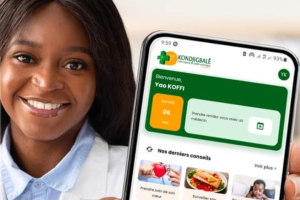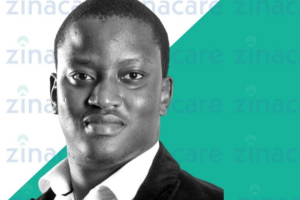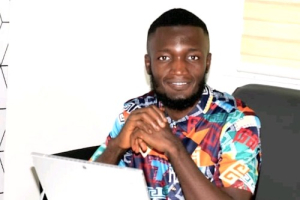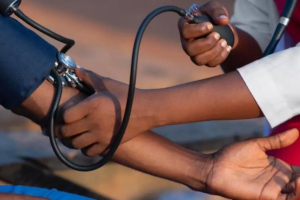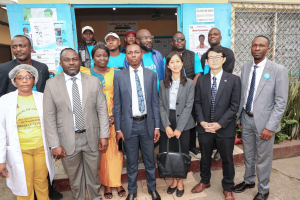Congo: AfriWell Health Connects Patients to Doctors via Web and Mobile Platforms
The e-health solution was established by a former banker, who ventured into entrepreneurship driven by her desire to transform telemedicine in Central Africa.
AfriWell Health, a Congolese healthtech startup, offers a platform for patients to connect with healthcare professionals for treatment. Founded in 2022 by Joelle Itoua Owona and based in Pointe-Noire, the startup secured an undisclosed funding from Google for Startups in March 2023 to bolster its growth.
The company’s solution, an Android-exclusive mobile application, allows users to register with their personal details and access a variety of healthtech services, including online appointments with general practitioners and specialists.
Since AfriWell Health has doctors worldwide, consultations are mainly carried out online. Owona’s goal with her healthtech solution is to address the doctor shortage in Africa, particularly in Congo. The platform maintains a digital medical record for each patient, providing doctors with a comprehensive view of their medical history.
The startup also facilitates healthcare provision for the Congolese diaspora to their relatives back home. Additionally, AfriWell Health provides a weekly updated list of on-duty pharmacies in Pointe-Noire, streamlining the medicine purchasing process for patients.
Adoni Conrad Quenum
Togo: KondjiGbalē Connects Patients, Doctors, and Pharmacies
In 2018, three young Togolese entrepreneurs launched a bespoke mobile application aiming to provide citizens with nationwide digital health records. This initiative aims to enhance access and improve healthcare delivery across the country.
KondjiGbalē is a healthtech solution developed by a Togolese startup that enables users to connect with healthcare professionals via its web and mobile platforms. The Lomé-based startup was founded in 2018 by three young Togolese, with Yvon Koudam as the CEO.
This application is like “a comprehensive digital health record, functioning similarly to a health passport. Additionally, it empowers patients to actively manage their medical history. For healthcare professionals, it facilitates diagnosis and streamlines the overall treatment process. Notably, the platform offers diverse access channels, including a website, mobile app, call center with local language support, and a USSD menu catering to areas with limited internet connectivity,” says Koudam.
The mobile application is only available on Android. After downloading, users must register by providing their details. Once registered, users can access a range of healthtech services, including a shared medical file, teleconsultation with doctors, online medication ordering and delivery, medication alerts, and the ability to locate nearby on-call pharmacies, streamlining healthcare access and management. These features enable users to proactively manage their health and efficiently obtain professional medical assistance and medication from home.
KondjiGbalē has received several awards since its launch. In 2019, it took first prize at the Fenes' Pitch Your Startup Idea and the Togo Innovation Challenge. According to Play Store data, the mobile app has been downloaded more than a thousand times.
Adoni Conrad Quenum
South Africa: Philip Mngadi democratizes access to essential health screening services
He aims to improve access to healthcare services in Africa. With Zinacare, he offers over 20 different tests, ranging from sexually transmitted infections to chronic diseases and even Covid-19.
Philip Mngadi (photo) is a South African serial entrepreneur with a decade of experience building products in Africa and Europe. He is the founder and CEO of Zinacare, a company revolutionizing access to essential health testing services in Africa.
His academic career began at University College Cork, where he graduated with a Bachelor of Laws in 2017. After his studies, he worked for Stripe in Ireland as a payments specialist before embarking on entrepreneurship.
In 2020, he launched Zinacare, allowing access to more than 20 different tests, which range from sexually transmitted infections to chronic diseases and COVID-19. He enables users to order test kits from the Zinacare platform and get them delivered to their homes or offices. Users can also send their samples to Zinacare's partner laboratory, which sends back the results online confidentially and securely. Zinacare also offers medical consultation, prescription, and post-test follow-up services.
Under the leadership of Philip Mngadi, Zinacare has received accreditation from the Health Professions Council of South Africa, the South African Health Products Regulatory Authority, the South African National Accreditation System, and the International Organization for Standardization. In addition, the company succeeded in attracting over 20,000 customers in 2022 and is on track to double the figure in 2023.
In June 2023, the startup was selected by Google to be part of the annual Black Founders Fund cohort in Africa. It has also joined StartUp Health's global community of healthcare founders and investors.
In addition to Zinacare, Philip Mngadi also founded Pago, a low-cost mobile micropayments platform for the informal sector to enable an inclusive economy by digitizing remittances through the use of blockchain technology. The company was incubated by the AlphaCode Incubate initiative in 2018.
In 2019, the serial entrepreneur also founded Tuma, a fintech that enables users to transfer funds from any instant money wallet such as eWallet, CashSend, and Send-iMali, to any bank account in South Africa.
Melchior Koba
Rwanda: Afia Pharma markets pharmaceuticals online
In some regions, in Africa, access to medicines can prove challenging. Startups operating in the distribution of pharmaceuticals are interesting alternatives for people living in those regions.
Afia Pharma is a digital solution developed by Rwandan firm Afia Group Ltd. It enables users to purchase pharmaceutical products online from the comfort of their homes. The Kigali-based start-up was founded in 2020 by Biganza Papy.
We are “on a mission to make quality medications accessible, available, and affordable to billions of people across Africa, to ensure that everyone has access to medicine at any time and everywhere,” Afia Pharma stated on its website.
Through its mobile apps –Android and iOS apps–, users can create accounts and purchase pharmaceuticals, from antivirals, vitamins, and antimalarials to anti-inflammatories.
To order on Afia Pharma, users need to simply search for the products they are looking for, add them to their cart, select the delivery option, and confirm the order. Users can upload their prescriptions for products that require so.
Afia Pharma accepts most electronic payment methods, such as credit cards. To help users take their medications as prescribed, Afia’s mobile app includes a reminder option.
In 2023, the healthtech solution was selected to join the second cohort of the pan-African Investing in Innovation (i3) program, supported by the Bill & Melinda Gates Foundation and Microsoft, among others. This selection entitles it to $50,000 in funding to accelerate its growth across Africa.
Adoni Conrad Quenum
Kenya: Zendawa empowers telepharmacy and e-consultations
In Africa, access to pharmacies and hospitals can prove challenging in some regions. To address the problem, e-health solutions have been introduced.
Zendawa is an e-health platform developed by a Kenyan startup. It enables access to pharmaceutical products and facilitates online appointments with doctors. The Nakuru-based start-up was founded in 2022 by Wilfred Chege. It aims to establish sustainable solutions in the health technology sector.
Currently, the solution has no mobile app. So, users have to visit its web platform to browse the various services it offers, without even having to create an account. Users need no account to even book an appointment. They just have to click on the "Make an appointment" button and fill in the required information, including the name, e-mail address, phone number, appointment date, and details about the medical condition.
Zendawa offers pharmacists a cash and inventory management service and access to working capital. "We leverage on Artificial Intelligence, based on data from our pharmacies' digital suite, to come up with credit scores which unlock access to capital for our pharmacies from our lending partners," it says on its web platform.
The platform also has a feature that allows doctors to share patients’ medical records. "We provide our medical practitioners with an integrated digital suite from which they can share patient's medical records and leverage on Artificial Intelligence to provide fully informed care decisions," Zendawa states.
Zendawa has launched a deferred payment service to facilitate supplies to pharmacies in the event of stock shortages. In 2023, it was selected as one of 29 African startups to take part in the second cohort of the Investing in Innovation (i3) program.
Adoni Conrad Quenum
With MedsToGo, South Africans can buy health products online
MedsToGo was launched by Ebrahim Ally, a South African finance professional, to facilitate the supply of pharmaceuticals in major South African cities.
MedsToGo is a business-to-customer e-health solution developed by a South African start-up, launched in 2016. It allows users to purchase prescription drugs, health items, vitamins, and baby care products.
Through its mobile (Android and iOS) apps, a user can create an account to access its services. For the account, the user needs the following information: name, email address, telephone number, and a secure password among other things. To place an order, the user must click on the "Orders" tab, and then specify whether the drugs and products are prescribed or self-prescribed. Once this step is completed, the user can access the virtual pharmacy, select the products needed, and finalize the purchase.
From Monday to Saturday, orders are delivered the same day when placed before noon. If not, they are delivered the following day. It should be noted that MedsToGo partners with numerous pharmacies in various parts of the country to facilitate the supply of pharmaceutical products.
In addition to this service, it integrates a messaging feature that enables messages to be sent to the pharmacist when needed. Among other things, it can help readjust the dosage of a patient's medication, or change it if the patient's condition is not improving.
For the time being, the startup wants to sustain its growth in the domestic market before considering an international expansion. Since its launch, the MedsToGo Android app has been downloaded over a thousand times.
Adoni Conrad Quenum
In Morocco, Mondentiste.ma Makes it Easy to Book Appointments with Dentists
After studying in Canada and working as a consultant at McKinsey, Sophia Alj became a digital entrepreneur, launching this startup for dentists.
Mondentiste.ma is an e-health solution developed by a young Moroccan startup. It allows dentists to manage their daily appointments and patients to schedule dental care appointments in several cities throughout the country. The app was launched in Casablanca in 2017 by Sophia Alj, a serial tech entrepreneur who also co-founded the startup Chari.ma and co-leads the incubator Wib.co.
The goal is to "connect dental health professionals, patients, and advertisers in the oral hygiene sector."
The solution features a mobile application available on iOS and Android for healthcare professionals. Dentists, using their smartphones, can check their appointment schedules in real time, book new appointments, and accept and modify online appointment requests. Patients, for their part, can access the service only via its web platform.
Users are not required to have an account to browse the platform. All they have to do is, based on their location, use the search bar and look up a dentist from available options. Next, they schedule an appointment, provided that the timeslot picked is available. With Mondestiste.ma, it is also easy to find a specific dentist, given that the user knows the first and last names of this professional.
The platform also includes a blog where topics related to oral health are discussed. Since its launch, the Mondentiste.ma app has been downloaded over a hundred times.
Adoni Conrad Quenum
Sierra Leone: Umar Bolokada Mansaray provides clean drinking water through Smart H2O
The computer scientist uses programming tools to find lasting solutions that will help his community and country as a whole.
Umar Bolokada Mansaray is a Sierra Leonean entrepreneur and self-taught computer scientist with expertise in front-end, mobile development, and UI/UX design. He co-founded Smart H2O in 2022.
Smart H2O aims to revolutionize water purification using computer programming tools. With his startup, Bolokada won the Community Mining Innovation Challenge the same year.
Umar Bolokada grew up in eastern Sierra Leone, a mining region with abundant natural resources. However, due to mining activities, the region was plagued with significant water pollution, and consequently, people in the area had low access to clean and safe drinking water. Bolokada, therefore, felt a deep responsibility to solve this problem and help his people.
Smart H2O works on building an advanced system using Arduino (an open-source electronic prototyping platform) and the Internet of Things (IoT) to detect and purify polluted water. By employing cutting-edge technology, the system can rapidly analyze water samples, identify contaminants, and apply appropriate purification methods. This process proves to be more efficient, cost-effective, and eco-friendly compared to conventional purification techniques.
The turning point in Bolokada's journey came in late 2022 when he “was introduced to the Orange Fab lab through a supportive friend and mentor.” This incubation by Orange Fab proved to be a game-changer, “providing vital resources, mentorship, and access to a wide network of experts and investors,” he revealed. This support accelerated Smart H2O's development, enabling Bolokada and his team to refine their algorithms, conduct real-world tests, and expand their research in regions facing water contamination challenges.
Though at its infancy stage currently, Bolokada “aims to reach many communities and expand beyond Sierra Leone in the coming years.”
Before founding Smart H2O, Bolokada had launched another startup called Kam Rent Ya in 2020, which aimed to simplify the rental process for housing seekers. Available on the web and mobile, the solution helps users find and rent properties remotely.
Beyond his entrepreneurial ventures, Bolokada worked as a UI engineer for Women Power Africa, an organization advocating for gender equality, in 2020. The following year, he founded Her Choice, a non-profit organization dedicated to empowering women and girls. Umar Bolokada Mansaray exhibits genuine leadership and innovation, poised to drive substantial transformation in the domains he operates within.
Hikmatu Bilali
DR Congo: Congo Medika, a Platform that Helps Residents Consult with Physicians Online
E-health startups are proving quite useful in helping the people of Africa have greater access to healthcare. In the Democratic Republic of Congo (DRC), a tech entrepreneur has developed a customized solution for his fellow citizens.
Congo Medika is an e-health solution developed by a Congolese startup. The platform’s users can book appointments with physicians for visits at home or their workplace. They can also have drugs delivered, and get health advice. Founded in 2021, by Emmanuel Epenge, the startup is based in Kinshasa.
Creating an account is compulsory to access the platform’s services. Details required include an email address and a username. Depending on a given user’s health issues and whether they want to book an appointment, the procedure is easy to follow. Personal information, the date and time of the appointment must be filled in for booking.
After sending the request, the user will be contacted and given details about the booked appointment. In addition to this service, the e-health platform also has an online pharmacy. It's possible to purchase various drugs and have them delivered to your home. Congo Medika provides information on all the medications sold in its online pharmacy.
The health advice service includes a blog and video sections. Health-related articles are posted on the blog and the videos offer the same kind of content, only in short formats for easier understanding.
Congo Medika also has a messaging feature that allows users to chat with physicians. The platform is available on Android. The startup behind the solution works with over 120 health professionals.
Adoni Conrad Quenum
Republic of Congo Launches "Mangwele," a Digital Health Application for Vaccination Reminders
Earlier this year, the Republic of Congo launched a project to speed up its digital transformation. In support of the move, the country’s partners have launched the "Mangwele" application designed to enhance the health information system.
On Wednesday, July 5, Congolese and Japanese authorities launched the "Mangwele" application, an SMS-based vaccination reminder system, at the Tenrikyo Integrated Health Center in Makélékélé.
The new system aims, among other things, to remind parents, particularly mothers, of their children's vaccination appointments according to the schedule of the Expanded Program on Immunization (EPI).
Lancement ce matin au CSI de Tenrikyo de MANGWELE. Grâce à ce projet financé par @JapanGov, votre bébé est enregistré dès la naissance et vous recevez un 📩 de rappel 3 jours avant chaque rdv de💉 #UNICEFTHXJAPAN @MofaJapan_en @ODA_mofa_japan @UNICEFinJapan pic.twitter.com/l7OFaArnn8
— UNICEF Congo Brazza (@UNICEFcongoBZV) July 5, 2023
"Through this project, health personnel will be able to follow the status of birth registrations and track each child's vaccinations by recording this information in a national database. This system will allow for individualized monitoring and ensure that all children receive all the necessary vaccines, even if they move regions," explained Satoko Morito, the First Secretary of the Japanese Embassy in Congo, representing the ambassador.
Mangwele’s launch is part of the UNICEF’s Digital Health System Support Project which fights infectious diseases in Africa. Japan spent $3.3 million on the launch.
The Democratic Republic of Congo and Benin are the two other beneficiary countries of Japan's financing for the implementation of the digital introduction project for the fight against infectious diseases in Africa.
In the long run, the project will help improve vaccination rates across the continent but also make it easier to analyze and use real-time data, thus enabling better estimation of actual vaccination rates, including routine and COVID-19 vaccination.
Samira Njoya



